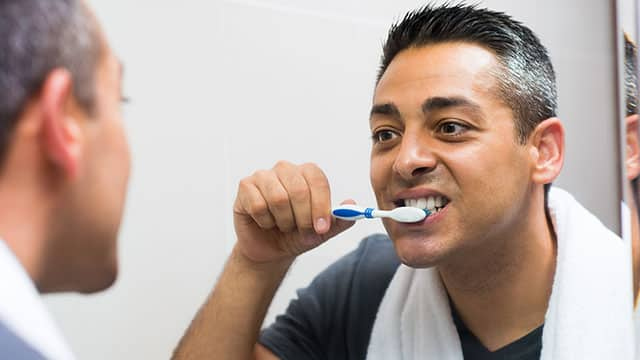1. Overly-Aggressive Brushing
Using excess pressure when brushing may feel like it keeps teeth and gums cleaner, but the opposite is true – aggressive brushing irritates your gums, which can cause more severe infections. As long as you're thorough, gentle pressure is sufficient for food and plaque removal. Use short, precise strokes to clean each tooth's entire surface. And chose soft-bristled toothbrushes, as they're best at effectively cleaning teeth without aggravating delicate gum tissue.
2. Improper Flossing Technique
Overzealous flossing is also a no-no. Avoid using high pressure or vigorous back-and-forth movements to dislodge food and plaque, as this can lead to further gum irritation or even bleeding gums (as well as being uncomfortable).
Prevent irritating gums while flossing with a gentle approach:
- Slowly move the floss back and forth, up and down, and gently against the sides of your teeth.
- With this level of pressure, flossing around the base of your teeth ensures that you reach food beneath your gumline – too much force can make this easy to overlook.
- Avoid pushing the floss into this area abruptly or snapping it into place, as doing so can cut or bruise your gums.
Not a fan of traditional flossing or just can’t get into the habit? Try using a water flosser, an interdental cleaning device that emits a steady stream of water to gently clean hard-to-reach places between your teeth.
3. Home Whitening Treatments
Peroxide-based agents will whiten teeth but can cause irritation if they come into contact with gum tissue. Because OTC whitening strips or trays aren't designed to fit the contours of your mouth, they may allow peroxide to touch your gums.
A dental professional can help you whiten teeth at home without irritating your gumline by creating a custom-fitted whitening tray. This tray will ensure that the bleaching products only come into contact with your teeth and not the delicate tissue beneath them.
4. Dietary Choices
The foods you eat are can also contribute to gum irritation. Hard candies or crunchy items like potato chips can scrape against gums and cause irritation as you chew. Can't give up the crunch? Reach for healthy alternatives like celery or carrots. Crunchy natural foods act like teeth cleaners by stimulating flow while scrubbing away bacteria and food particles.
Treating Your Irritated Gums
If your gum irritation feels or looks serious, make an appointment with a dental professional, as it could be symptomatic of a different oral health condition. But if one of these four self-induced causes is the culprit, home remedies can ease gum irritation. An article in The Times of India suggests 5 natural remedies to get rid of tooth and gum pain that includes salt water, garlic, essential oils, tea bags, Aloe vera.
Irritated gums are no fun, but making small changes to daily habits and can make a difference. The sooner you get to the root of the cause, the sooner you’ll be able to treat your irritated gums and get back to a pain-free, confident smile.
This article is intended to promote understanding of and knowledge about general oral health topics. It is not intended to be a substitute for professional advice, diagnosis or treatment. Always seek the advice of your dentist or other qualified healthcare provider with any questions you may have regarding a medical condition or treatment.
ORAL HEALTH QUIZ
What's behind your smile?
Take our Oral Health assessment to get the most from your oral care routine
ORAL HEALTH QUIZ
What's behind your smile?
Take our Oral Health assessment to get the most from your oral care routine













